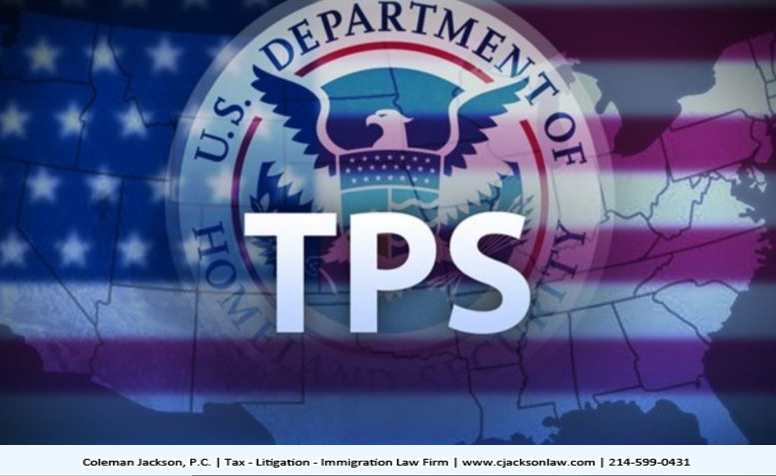Temporary Protected Status (TPS)
Coleman Jackson, P.C. | Transcript of Legal Thoughts
Published December 12, 2022
Legal Thoughts is an audiocast presentation by Coleman Jackson, P.C., a law firm based in Dallas, Texas serving individuals, businesses, and agencies from around the world in taxation, contract litigation, and immigration legal matters.
This episode of Legal Thoughts is an audiocast where the Attorney, Coleman Jackson is being interviewed by Alexis Brewer, Tax Legal Assistant of Coleman Jackson, P.C. The topic of discussion is “TEMPORARY PROTECTED STATUS (TPS).” You can listen to this podcast by clicking here: https://anchor.fm/coleman-jackson/episodes/TEMPORARY-PROTECTED-STATUS-TPS-e1ot2v4
If you enjoy this podcast, make sure to stay tuned for more episodes from the taxation, litigation, and immigration Law Firm of Coleman Jackson, P.C. Be sure to subscribe. Visit the taxation, litigation and immigration law firm of Coleman Jackson, P.C. online at www.cjacksonlaw.com.
TRANSCRIPT:
ATTORNEY: Coleman Jackson
LEGAL THOUGHTS
COLEMAN JACKSON, ATTORNEY & COUNSELOR AT LAW
ATTORNEY: Coleman Jackson
Welcome to Legal Thoughts
My name is Coleman Jackson and I am an attorney at Coleman Jackson, P.C., a taxation, contract litigation and immigration law firm based in Dallas, Texas.
In addition to myself, we have Alexis Brewer – Tax Legal Assistant, Leiliane Godeiro – Litigation Legal Assistant, and Johanna Powell – Tax Legal Assistant.
On today’s “Legal Thoughts” podcast, our Tax Legal Assistant, Alexis Brewer, will be interviewing me on the important immigration topic of: “TEMPORARY PROTECTED STATUS.”
INTERVIEWER: Alexis Brewer, Legal Assistant
Hi everyone, my name is Alexis Brewer and I am a Tax Legal Assistant at the tax, contract litigation and immigration law firm of Coleman Jackson, Professional Corporation. Our law firm is located at 6060 North Central Expressway, Suite 620, right here in Dallas, Texas.
Good afternoon, Attorney; thank you for agreeing to sit with me as I interview you with respect to this important immigration law topic: “TEMPORARY PROTECTED STATUS?”
Let’s jump right in,
Question 1: What does the legal term “Temporary Protected Status” mean?
Attorney Answer – Question 1:
Good morning, Alexis. The Immigration Act of 1990 (IMMACT 90) established a procedure by which the U.S. Attorney General may provide Temporary Protected Status (TPS) to nationals of a particular country who are in the United States and are unable to return to their home country due to-
- Ongoing armed conflict within the state and, due to that conflict, the return of nationals to that state would pose a serious threat to their personal safety.
- An environmental disaster resulting in a substantial, temporary disruption of living conditions, the state is temporarily unable to adequately handle returning nationals and the state therefore requests TPS designation.
- Other extraordinary and temporary conditions in the state that prevent nationals from returning safely, unless the Attorney General finds that permitting nationals of the state to remain temporarily is contrary to the national interest of the United States.
After consultation with the appropriate agencies of the government, the Attorney General (AG) may decide to designate a foreign state or part thereof as eligible for TPS because one or more of the reasons discussed in this podcast have been met.
Notice of the designation is published in the Federal Register. TPS designation will be effective for a minimum of 6 months to a maximum of 18 months. Sixty days prior to the end of the designated TPS period, the Attorney General will review the conditions in the designated state and determine whether the designated conditions still exist. If so, the TPS designation could be extended for an additional 6, 12, or 18 months.
INTERVIEWER: Alexis Brewer, Legal Assistant
That leads me right into my next question –
Question 2: Who is eligible to apply for Temporary Protected Status?
Attorney Answer – Question 2:
That’s a great question.
An individual may be eligible for TPS if they are a national of a country designated by the Attorney General for Temporary Protected Status, or if the individual is a person who has no nationality but last habitually resided in the TPS designated country.
Individuals must consult the Federal Register or USCIS website to ascertain whether they are nationals of countries with TPS designations and they must apply for TPS during the specified registration period.
Certain individuals are ineligible for TPS; such as,
- Individuals who are not nationals of the designated TPS country. Non-nationals who have not habitually resided in the designated country just prior to coming to the United States are also ineligible;
- Individuals who do not register for TPS during the initial registration period;
- Individuals who cannot demonstrate continuous physical presence in the United States since the effective date of the TPS designation;
- Individuals who are inadmissible as an immigrant due to conviction of any felony or two or more misdemeanors and individuals who are inadmissible for other reasons, such as, national security; and
- Individuals who do not meet residency requirement stated by the Attorney General when making the designation.
INTERVIEWER: Alexis Brewer, Legal Assistant
Question 3: What are some benefits for individuals who are in the United States on temporary protected status?
Attorney Answer – Question 3:
The benefits that an individual can obtain by applying for temporary protected status during the designated TPS registration period are that upon approval of their Form I-821:
- Individuals on TPS can reside in the United States without the fear of being deported to their home country
- Individuals on TPS can apply for work authorization by filing Form I-765 when they file for TPS and work anywhere in the country;
- Individuals on TPS can file Form I-131 to apply for advance parole to obtain travel authorization; and
- Some of the filing fees may be waived upon request.
These are some of the legal benefits that individuals could obtain by Temporary Protected Status. A real and enormous benefit of TPS is the potential to live a peaceful and productive life.
INTERVIEWER: Alexis Brewer, Legal Assistant
Question 4: What happens when the temporary protected status designated period ends?
Attorney Answer – Question 4:
Temporary protected status is a temporary benefit. TPS does not lead to lawful permanent resident status nor does it lead to any other immigration status. Therefore, when the TPS period ends the national of the designated country must return to their home country, or they will begin to accrue unlawful presence in the United States. The national can be deported from the United States if they refuse to leave voluntarily once their TPS ends.
Keep in mind; however, the Attorney General may review the conditions in the designated country and extend the TPS designation as I discussed earlier during this podcast. TPS can be extended and often has been extended in the past. Some individuals have been here for years on TPS. Good examples of this are nationals here on TPS from El Salvador, Haiti, Honduras, Nepal, and Nicaragua.
INTERVIEWER: Alexis Brewer, Legal Assistant
Question 5: What countries have the Attorney General currently designated for Temporary Protected Status?
Attorney Answer – Question 5:
The Attorney General has made many TPS designations over the years; current designated countries are – Afghanistan, Burma (Myanmar), Cameroon, El Salvador, Haiti, Honduras, Nepal, Nicaragua, Somalia, Sudan, South Sudan, Syria, Ukraine, Venezuela, and Yemen.
For specified designations and eligibility and other issues regarding a particular country, a particular national or particular habitual resident of a designated country, we need to evaluate each situation on a case-by-case basis in our office since often the application of law is more complex than it might first seem. Facts matter in law as they do in life.
INTERVIEWER: Alexis Brewer, Legal Assistant
Attorney, I know you touched on Temporary Protected Status eligibility requirements previously; but could you expand on this since immigrant cases can have a lot of complicating facts and circumstances.
Question 6: What are the eligibility requirements for nationals of the Temporary Protected Status designated countries?
Attorney Answer – Question 6:
True, as I have previously stated, facts matter in law and in life! Nationals and habitual residence of the TPS designated country must apply for TPS and meet all of the following eligibility requirements:
- Be a national of a country designated for TPS, or a person without nationality who last habitually resided in the designated country;
- Apply during the open initial registration or re-registration period, or you meet the requirements for late initial filing during any extension of your country’s TPS designation;
- Have been continuously physically present (CPP) in the United States since the effective date of the most recent designation date of your country; and
- Have been continuously residing (CR) in the United States since the date specified for their home country. The law allows an exception to the continuous physical presence and continuous residence requirements for brief, casual and innocent departures from the United States. When you apply or re-register for TPS, you must inform USCIS of all absences from the United States since the CPP and CR dates. USCIS will determine whether the exception applies in your case. USCIS exercises discretion in TPS cases; so, the presentation of your case matters.
INTERVIEWER: Alexis Brewer, Legal Assistant
Question 7: What kind of things could make an individual ineligible for Temporary Protected Status?
Attorney Answer – Question 7:
An individual may not be ineligible to apply for temporary protected status if they:
- Have been convicted of a felony or two or more misdemeanors committed in the United States;
- Are found inadmissible as an immigrant under inadmissible grounds in INA section 212(a), including non-waivable criminal and security-related grounds;
- Are subject to any of the mandatory bars to asylum. These include, but are not limited to, participating in the persecution of another individual or engaging in or inciting terrorist activity;
- Failure to meet the continuous physical presence and continuous residence in the United States requirements;
- Failure to meet initial or late initial TPS registration requirements; or
- If granted TPS, failure to re-register for TPS, as required, without good cause.
Interviewer Wrap-Up
Attorney, thank you for siting with me today to explain you for being here today with us, this information is very important for nationals who are here in the United States and who are from countries designated by the U.S. Attorney General as temporary protected status (TPS).
It seems like the take away here is that some nationals in the United States could be eligible to apply for temporary protected status but the process could be complex and require attorney guidance and representation.
To our listeners who want to hear more podcast like this one please subscribe to our Legal Thoughts Podcast on Apple Podcast, Google Podcast, Spotify or where ever you listen to your podcast. Take care, everyone! And come back in about two weeks, for more taxation, litigation and immigration Legal Thoughts from Coleman Jackson, P.C., located right here in Dallas, Texas at 6060 North Central Expressway, Suite 620, Dallas, Texas 75206.
English callers: 214-599-0431 | Spanish callers: 214-599-0432 |Portuguese callers: 214-272-3100
Attorney Closing Remarks
This is the end of today’s Legal Thoughts!
Thank you all for giving us the opportunity to inform you about: “TEMPORARY PROTECTED STATUS”
If you want to see or hear more taxation, litigation and immigration LEGAL THOUGHTS from Coleman Jackson, P.C. Subscribe to our Legal Thoughts Podcast on Apple Podcast, Google Podcast, Spotify or wherever you listen to your podcast.
Stay tuned! We are here in Dallas, Texas and want to inform, educate and encourage our communities on topics dealing with taxation, litigation and immigration. Until next time, take care.


